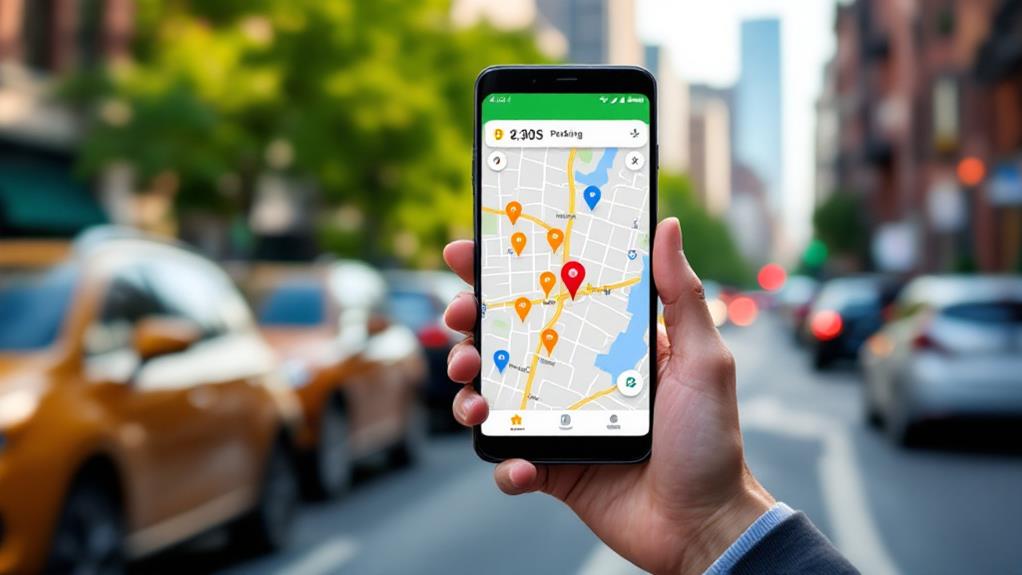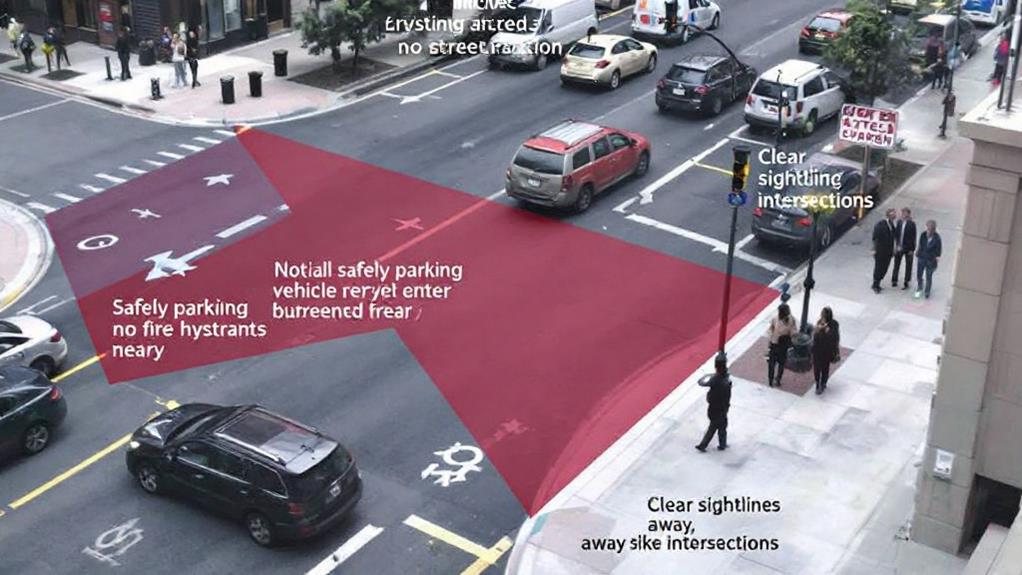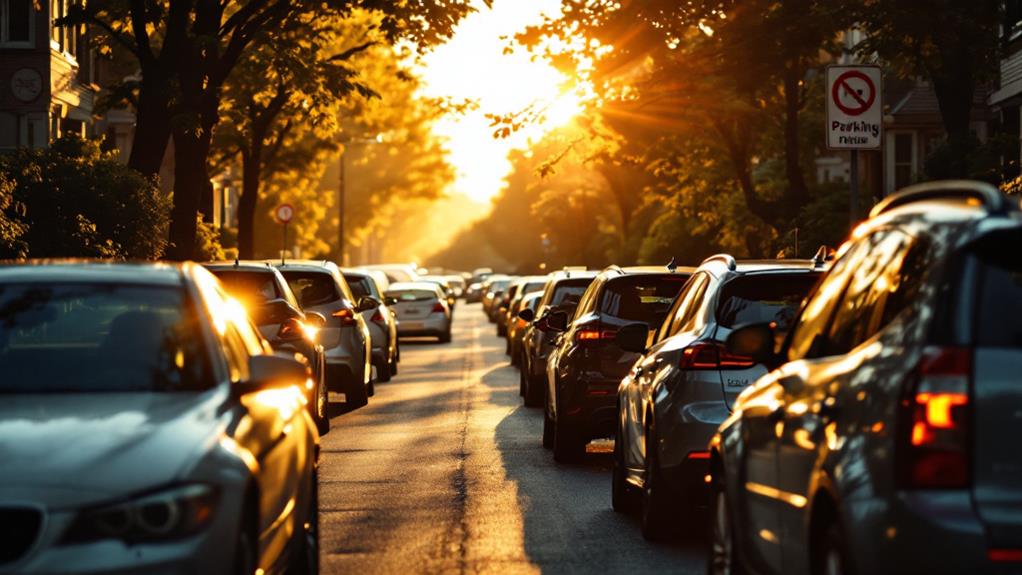How to Handle Street Parking During Street Cleaning Days
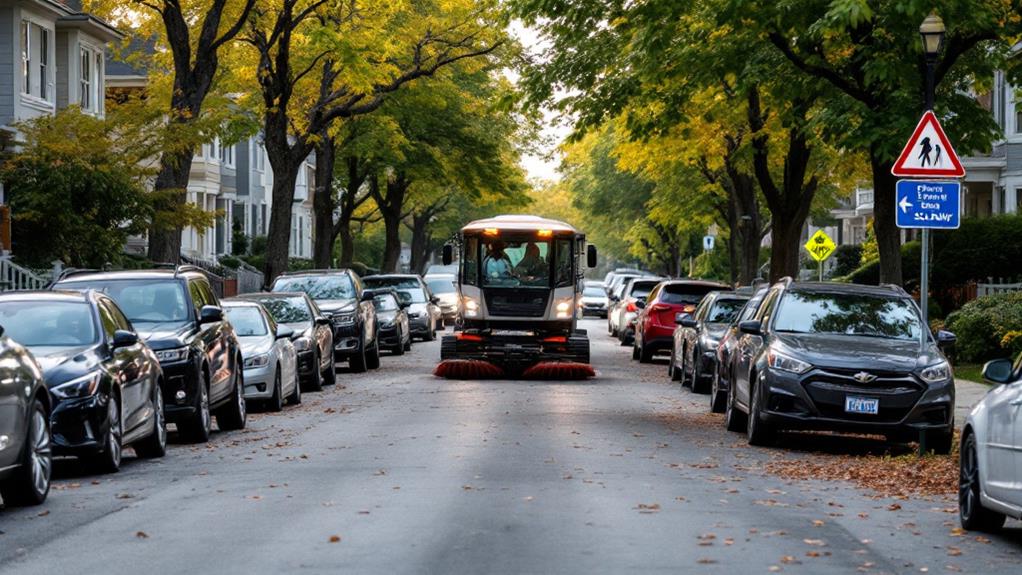
To manage street parking during cleaning days, start by comprehending your area's sweeping schedule. Seek out alternate parking options like nearby lots or garages. Set up prompts through city apps or notifications to avoid forgetting. Communicate with neighbors to share information and potentially collaborate on solutions. Consider applying for temporary parking permits if available. Stay aware of street cleaning signage and plan ahead for extended absences. Remember, non-compliance can lead to fines or towing. By staying informed and proactive, you'll traverse street cleaning days with ease. Uncover more strategies to guarantee you're always one step ahead of the street sweeper.
Understanding Street Sweeping Schedules
Many cities implement regular street sweeping schedules to maintain clean roads and prevent debris buildup. To effectively manage your parking during these times, it's paramount to understand when and where street sweeping services occur in your area.
Typically, scheduled sweeping takes place on a weekly or monthly basis, depending on your city's policies. You'll want to familiarize yourself with the specific days and times for your street. Most cities provide this information on their official websites or through their Public Works Department. Take the time to look up your area's schedule and make note of it.
Keep in mind that the sweeping period is usually lengthy to allow for complete coverage of all routes and potential delays. This means you'll need to plan ahead for alternative parking options during these times. It's essential to adhere to parking restrictions during scheduled sweeping to avoid citations and safeguard the streets are properly cleaned.
Alternate Parking Options
Several alternate parking options are available during street cleaning days to help you avoid citations and safeguard your vehicle is safely stored. Many cities offer temporary parking solutions in designated lots or garages, often at free or reduced rates. These alternatives guarantee your car is out of the way when the street sweeper comes through.
Check your city's website or contact the local public works department to find information about street cleaning schedules and alternate parking options. Some municipalities provide parking permits that allow you to keep your car on the street during cleaning times without receiving a ticket.
If city-provided options aren't available, look into nearby private parking lots or garages. They may offer special event pricing or discounts on street cleaning days to accommodate displaced vehicles. Additionally, consider carpooling, using public transportation, or ride-sharing services as viable alternatives to avoid parking issues altogether.
Reminder Systems and Alerts

Staying informed about street cleaning schedules is crucial to avoid parking tickets and guarantee your vehicle isn't in the way. Fortunately, many cities now offer various update systems and alerts to help you stay on top of street sweeping days.
You can take advantage of online or mobile app-based street sweeping schedule updates provided by your city. These tools often allow you to input your address and receive notifications about upcoming cleaning days in your area. Some municipalities have gone a step further by implementing automated phone call or text message systems to alert residents when their street is posted for parking restrictions due to sweeping.
Don't overlook the power of community-based alerts. Neighborhood social media groups and community newsletters can be excellent sources of information about local street cleaning schedules. Additionally, keep an eye out for physical signs or flyers posted on your street prior to sweep days.
For a more personalized approach, consider subscribing to email or push notification alerts from your city's sanitation department. These services can provide timely updates and make sure you're always aware of when to move your vehicle.
Communicating With Neighbors
Effective communication with your neighbors is key to ensuring everyone on your street is prepared for cleaning days. To spread the word about upcoming street cleaning services, utilize community message boards, social media platforms, or go door-to-door. These methods help inform residents about schedules and parking restrictions, reducing the risk of fines and ensuring a smoother cleaning process.
Encourage your neighbors to share this information with their household members and guests to prevent any parking issues on cleaning days. You can also work with your local government to distribute official reminders and notices throughout the community, reinforcing the importance of compliance.
Consider coordinating with your neighbors to address any challenges or concerns regarding street cleaning day parking. This collaborative approach can lead to creative solutions, such as carpooling or temporary parking arrangements. By promoting open communication, you'll create a supportive environment where everyone works together to keep the streets clean and avoid parking violations.
Temporary Parking Permits
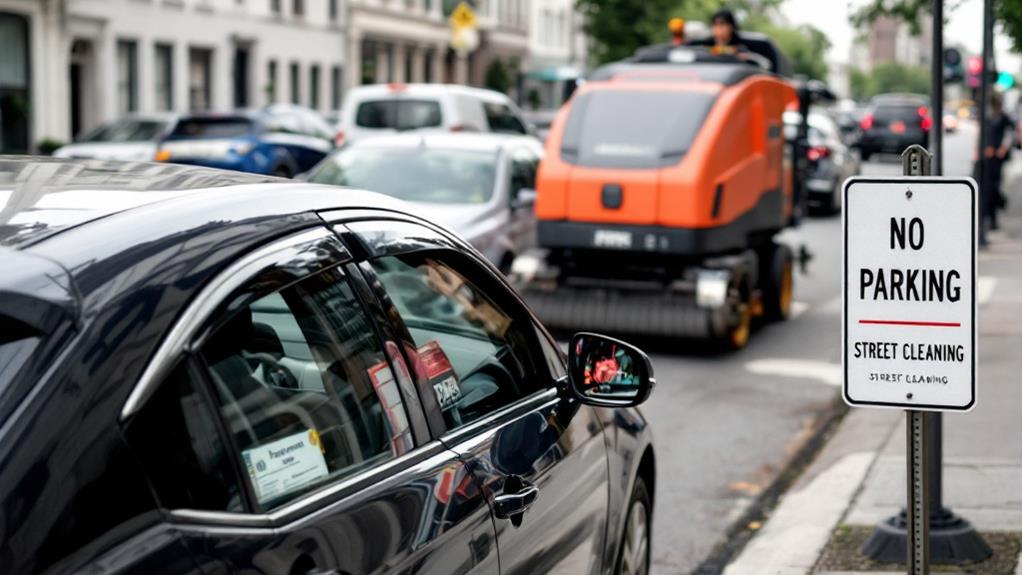
A lifeline for residents during street cleaning days, temporary parking permits offer a solution to the parking dilemma. Many cities provide these permits to allow you to park on the street during scheduled sweeping times without risking a citation or tow.
To obtain a temporary parking permit, you'll need to apply in advance. Most cities offer multiple application methods, including online, phone, or in-person options. You'll typically need to provide information such as your license plate number. Be aware that these permits are usually valid for specific date ranges or a set number of days per year, aligning with street cleaning schedules.
While there's often a small fee associated with temporary parking permits to cover administrative costs, it's generally nominal and worth the peace of mind. Remember, if you don't secure a permit and park on the street during sweeping times, you may face hefty fines or even have your vehicle towed.
Street Cleaning Signage Awareness
Regularly observing street cleaning signage is essential for avoiding parking violations and fines. As a resident or visitor, you'll notice these signs posted along the streets, indicating specific days and times when parking is prohibited. It's paramount to familiarize yourself with the street cleaning schedule in your area to ensure you don't inadvertently park in restricted zones during power sweeping services.
To stay informed, make it a habit to check the signage whenever you park. Pay close attention to the designated days and hours when cleaning services are scheduled. Remember, these restrictions are in place to allow street sweepers to effectively clean the roads, maintaining cleanliness and hygiene in your neighborhood.
Planning for Extended Absences
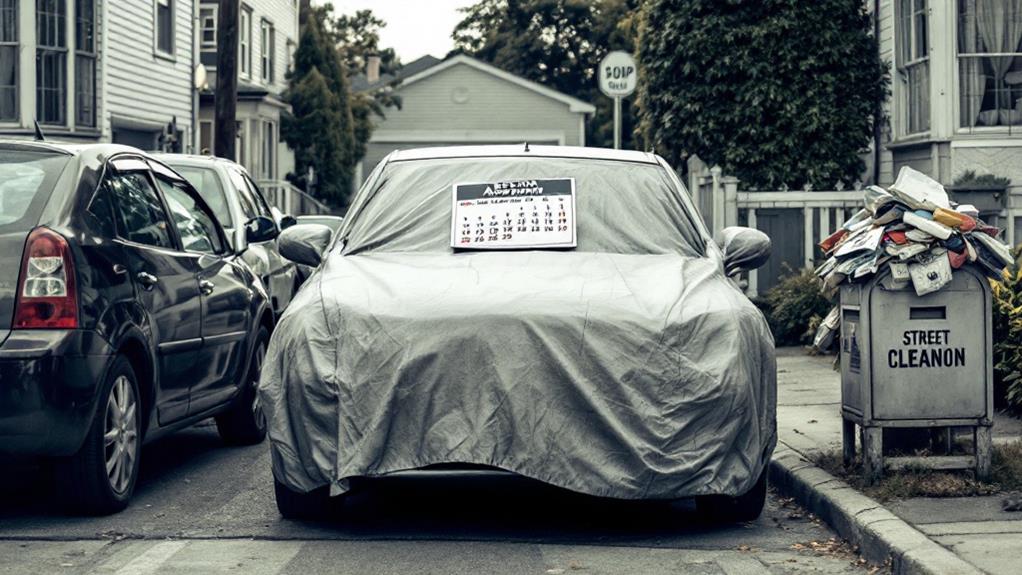
Planning ahead for extended absences is critical when you live in an area with regular street cleaning schedules. If you're going to be away during scheduled street sweeping hours, you'll need to make certain your vehicle doesn't interfere with the cleaning operations. To avoid tickets or towing, park your car in a location that's not subject to street sweeping during your absence.
Consider utilizing nearby parking garages or lots as alternatives to street parking. If these aren't available, look for legal street parking in areas where street washing services aren't scheduled during your time away. You can also ask a trusted friend or neighbor to move your vehicle to a compliant spot on cleaning days. If you don't have someone to help, consider hiring a professional service to relocate your car when necessary.
To plan effectively, check your city's website or contact the public works department for the street sweeping schedule in your neighborhood. This information will help you determine when and where your vehicle cannot be parked on the street. By taking these proactive steps, you'll avoid penalties and ensure your vehicle doesn't hinder the street cleaning process while you're away.
Consequences of Non-Compliance
Failing to comply with street sweeping regulations can lead to significant consequences for vehicle owners. If you leave your car parked during scheduled street sweeping hours, you're risking more than just a dirty street. Your vehicle may be ticketed and towed at your expense, causing inconvenience and financial strain.
The fines for parking in a posted street sweeping zone aren't cheap. You'll face a penalty ranging from $35 to $70, with an additional $35 fee if you don't pay within 30 days. If your car is towed, the costs escalate quickly. You'll be hit with a $155 towing fee and daily storage charges of $20 to $50. These expenses add up fast, making it essential to be reliable in moving your vehicle on time.
Repeat offenders face even harsher consequences, including the possibility of having their vehicles impounded. This not only increases your financial burden but also creates additional hassles in retrieving your car. Additionally, your failure to move your vehicle impedes the street sweepers' work, leading to incomplete cleaning and potential environmental and public health issues. For Additional Information on specific regulations in your area, consult your local parking authority.
